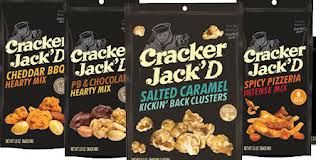
Caffeine is a psychoactive substance that is a dream product ingredient for many American beverage and food corporations. It is a central nervous system stimulant, it is addictive, and it has been widely accepted by the public as an additive for many very profitable products. Caffeinated colas have been a beverage preferred by children over several generations, and consumption continues to grow. And while coffee was long considered an adult beverage, a large and growing number of children and adolescents drink it daily. So-called “energy” drinks are also consumed by many children. Although beverages are the primary mediums for caffeine delivery, food manufacturers have begun to market products to adults and children that contain caffeine. A good deal of attention has been paid recently to the release of a new product, Cracker Jack’d, that is a variation of a venerable brand. According to the Frito-Lay company, the original product is…
“A delicious blend of caramel coated popcorn and peanuts is just as good as you remember. And who can forget the thrill of opening the toy surprise inside!”
Evidently, consumers will now be able get a considerable dose of caffeine in addition to the caramel coated popcorn, the peanuts, and of course the toy surprise.
So, what could possibly be wrong here? We know from decades of research and ample personal testimony that caffeine ingestion in sufficient quantities disrupts sleep. The problem is that amounts of caffeine in products consumed by children have grown steadily since back when things were “…as good as you remember.” While many adults remember the iconic Coca-Cola bottles that held 6.5 ounces, today the smallest serving in movie theatres is at least 16 ounces, with sizes ranging far beyond that to over 40 ounces. The recent decision in New York City to impose a ban on serving soda in containers larger than 16 ounces has generated a spirited controversy among passionate proponents and opponents.
The predominant reason for the ban has to do with efforts to control obesity. Concerns about children’s sleep have only been occasionally expressed. Likewise, as initiatives to remove soft drink machines from school have been implemented, the primary concern has been on the deleterious effects on nutrition and health rather than on the effects on sleep.
Consuming caffeine can disrupt sleep and result in daytime sleepiness that impairs the ability to learn and remember in school and compromises emotion regulation. Caffeine is used as a stimulant to compensate for daytime sleepiness, acting as both a cause and a remedy for sleepiness.
Much alarm is regularly expressed about underachievement and problem behavior in school. We are learning that insufficient sleep may be partly to blame, and increasing levels of caffeine consumption very likely are involved.
Regulations to restrict availability of these products are worth pursuing, but simpler actions are possible. For parents who are concerned about children’s insufficient sleep and daytime sleepiness, reducing children’s consumption of colas, energy drinks, and caffeinated snacks may prove beneficial in numerous ways beyond weight control.


